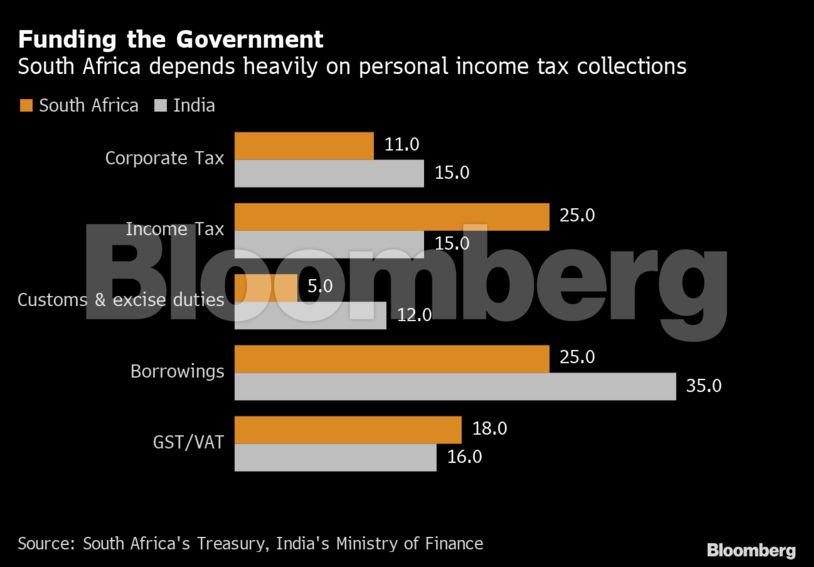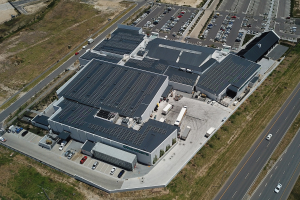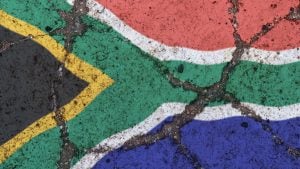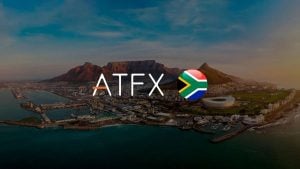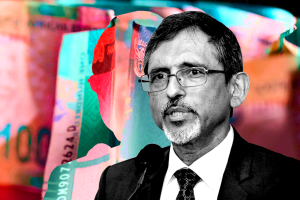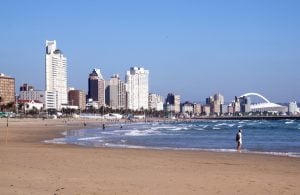Winners and losers from South Africa’s budget
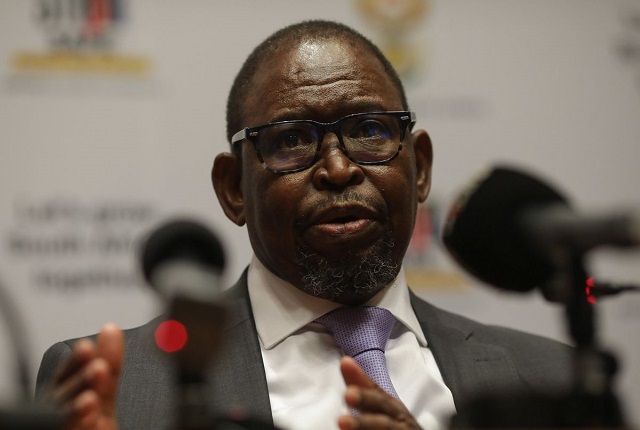
South Africa’s finance minister Enoch Godongwana, six months into the job, presented a budget that backs up president Cyril Ramaphosa’s focus on businesses in a bid to add jobs.
The minister announced some tax relief to boost investment and consumer spending, which should help stimulate the economy. However, he had to balance that with measures to stabilize and eventually reduce government debt.
Here’s a short list of winners and losers from Wednesday’s budget announcements.
Winners:
Corporates:
Godongwana followed through on a pledge first made two years ago to cut tax for companies. The reduction in the rate – to 27% from 28% for the year starting April 1 – is the first since 2008. The move that will cost the government R2.6 billion in revenue for 2022-23 should boost investment and reduce tax avoidance.
It also brings South Africa closer to the Organisation of Economic Co-operation and Development’s average corporate tax rate of 23%.
In a further step to spur companies to help employ young people in a country with a youth unemployment rate of 56%, the government will increase an employment tax incentive by 50% to a maximum of R1,500 ($99.70) per month.
Big Emitters:
The Treasury will extend the first phase of its carbon tax by three years until December 2025. That means companies such as Sasol and the state-owned Eskom Holdings can benefit longer from tax-free allowances and revenue-recycling measures. The carbon price, though, will rise progressively each year.
Motorists:
Car owners, users of public transport and other consumers will get some relief from the Treasury not increasing the fuel and Road Accident Fund levies for the first time since 1990. The cost of a liter of fuel rose about 40% last year due to the rebound in oil prices, pushing consumer inflation to the highest level in almost five years. Taxes make up a third of what motorists pay at the pump.
Middle-Income Taxpayers:
Tax brackets will be increased in line with the 4.5% inflation the Treasury projects for the 2022-23 fiscal year, shielding people who pay personal income levies from so-called “bracket creep.”
Below-inflation adjustments to personal income tax brackets and fuel levies are usually an easy source of extra revenue for the state.
The relief is mainly targeted at people in the middle-income group, the Treasury said.
Welfare Recipients:
Monthly social grant payouts to pensioners, military veterans and people with disabilities will increase by 5%, compared with only 1.6% last year. The child support grant will rise by 4.3%. Millions of people rely on these payments as their only source of income and the adjustment should boost consumer spending.
Losers:
State Workers:
Civil servants will have to accept the Treasury’s hard line on pay increases or face possible retrenchment. The budget shows total compensation will only grow by an annual average of 1.8% for the next three years and while it allocates R20.5 billion in 2022-23 to meet the cost implications of a 2021 wage deal, there is no extra funding provision beyond that.
This could anger labor unions representing the 1.3 million people employed by the government.
The Wealthy:
People with business interests who pay provisional tax and who have assets worth more than R50 million will have to start declaring specified assets and liabilities at market values in their tax returns.
The Treasury says this will “assist with the detection of non-compliance or fraud through the existence of unexplained wealth,” which means the super-wealthy may end up paying more.
Sugar Producers:
The struggling sugar industry could face further reduction in demand when the health promotion levy on sweetened drinks increases by 4.5%. That could hurt companies such as Tongaat Hulett. The government will also start consultations to lower the tax threshold for sugar content and extend the measure that was first announced in the 2017 budget to fruit juices.
Alcohol and Tobacco Industry:
An increase of 4.5% to 6.5% in excise duties on alcohol will add extra pressure to an industry that was hit hard by some outright sale bans and more than two years of trading restrictions as part of South Africa’s Covid-19 regulations.
In addition to increases of 5.5% to 6.5% in the levies on tobacco products, the government proposed a flat excise duty on nicotine and non-nicotine solutions. That will add to the price of vaping products.
Budget Highlights:
Below are the highlights of South Africa’s 2022 annual budget:
- The budget continues last year’s shift to more market-friendly policies, with windfall revenue partly from a commodities boom used to reduce taxes and the deficit.
Forecasts
- The consolidated budget shortfall is forecast at 5.7% of gross domestic product for the fiscal year to end-March. That’s down from the 7.8% projected three months ago.
- R182 billion more tax will be collected than expected in the 2021 budget.
- The shortfall is seen at 6% in 2022-23, narrowing to 4.2% by 2024-25.
- Spending will increase to R2.157 trillion in 2022-23 from R2.077 trillion this fiscal year.
- The Treasury anticipates a primary budget surplus in 2023-24, a year earlier than it projected in November.
Taxes
- Many of the tax hikes of past years did nothing to boost revenue or the economy, the National Treasury says.
- “Taxes inevitably distort economic activity as taxpayers change their behavior”.
- Godongwana keeps to his predecessor’s plan to lower the company tax rate by a percentage point to 27%.
- The effect of the drop will be offset by restricting the use of assessed losses (offsetting of the balance of losses brought forward will be limited to 80% of taxable income). Smaller companies will be exempt, though.
- The employment tax incentive increases by 50% to help encourage companies to hire more young people.
- Individuals get relief, through adjustments to tax brackets and thresholds.
- The fuel and Road Accident Fund levies stay the same – that’s the first time since 1990 that those taxes haven’t increased.
- To clamp down on unexplained wealth, all provisional taxpayers with assets of more than R50 million will have to declare specified assets and liabilities at market values in their 2023 returns.
- First phase of the carbon tax, with its tax-free allowances and revenue-recycling measures, is extended for three years until the end of 2025. The government plans to progressively increase the carbon price each year.
- A “bounce-back” project will be introduced to help small businesses, with r15 billion of loan guarantees offered through lenders.
Debt
- The debt trajectory improves again
- Gross debt is now seen peaking at 75.1% of GDP in 2024-25, as opposed to November’s forecast of 78.1% in 2025-26.
- The government borrowing requirement falls further, with the amount needed for the current fiscal year at R412 billion compared with R475 billion envisaged in November.
- It’s seen at r484 billion in 2022-23 and staying around that level for the following two years.
- Net income from Treasury bills will be zero in the year to end-March 2023.
- A floating rate bond and domestic rand-denominated sukuk remain part of the funding strategy.
- An RSA retail savings top-up bond will be offered in April.
Welfare
- The Treasury budgets R44 billion for the extension of the jobless relief payment for the coming year.
- The continuation of such a “social transfer” would need to be matched by permanent spending reductions and tax-revenue increases.
- “In the absence of higher economic growth that supports long-term improvements in revenue collection, any proposals to fund permanent additions to public expenditure require careful scrutiny”.
- Most existing welfare payments increase by 5% from April.
- Nearly half of the 60 million people in the country receive at least one social grant.
Growth
- Economic growth is seen averaging 1.8% over the next three years
- Growth is estimated at 4.8% in 2021 (down from the 5.1% projected in November) and 2.1% this year.
- The combined impact of structural reforms, support for small business and new infrastructure investments will support growth, Treasury says.
Spending
- There is more money allocated for infrastructure projects and R18.4 billion is earmarked to boost youth employment and to create short-term jobs over the next two years.
- R8.7 billion is added to the police budget, partly to hire more officers.
Eskom
- There was no announcement on Eskom’s debt restructuring plans.
- Eskom didn’t meet the Dec. 31 deadline to complete the legal separation of the transmission unit, in part because lenders haven’t yet approved the proposed restructuring.
- The utility was given special dispensation to access additional guaranteed debt of R42 billion in 2021-22 and 25 billion rand in 2022-23.
- “The National Treasury is working on a sustainable solution to deal with Eskom’s debt in a manner that is equitable and fair to all stakeholders,” Godongwana says in his speech.
